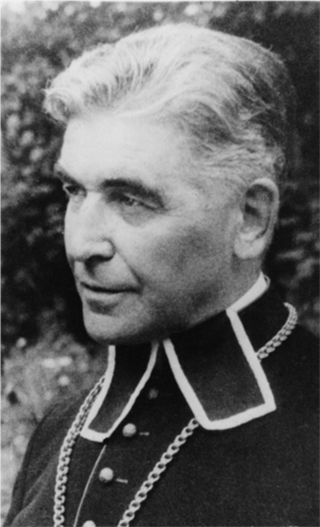Karl Ulitzka

Personalia
Born:
Died:
Profession:
Persecution:
Imprisonment 28.10.1944 - 25.11.1944,
Dachau concentration camp 25.11.1944 - 29.04.1945
KZ Number:
Memberships
Curriculum Vitae
Born in Upper Silesia, Karl Ulitzka attended grammar school in Ratibor [Raciborz - now Poland], graduated there in 1894 and shortly afterwards began studying theology as an external student in Graz, where he joined the student association Carolina Graz in 1894. He continued his studies at the Faculty of Theology in Breslau, where he became active in the student fraternity Winfridia. He was ordained a priest here in 1897.
He initially worked as a chaplain in Kreuzburg [Kluczbork]/Upper Silesia, was appointed parish administrator in Bemau near Berlin in 1901 and returned to his native Upper Silesia in 1910 as parish priest at St. Nicholas in Ratibor-Altendorf. He retained this parish until 1945. This is also where his political activities began. He soon became chairman of the Center Party in Upper Silesia. After the First World War, he became a member of the Weimar National Assembly in 1919, from 1920-1933 he was a member of the Reichstag, where he also chaired the Foreign Affairs Committee, and from 1923 he was a member of the board of the Center Party in the Reichstag. From 1922-1933, he was a member of the provincial parliament.
He initially campaigned for an independent Upper Silesia as a federal state of the German Reich, but then, when the newly-formed Poland wanted to incorporate the whole of Upper Silesia, for the status quo, i.e. for his homeland to remain part of the German Reich. During the three Polish uprisings (1919-1921) and the votes that led to the secession of East Upper Silesia, Karl Ulitzka was a staunch representative of the pro-German movement, but, unlike his Polish opponents, refrained from using violence.
This commitment brought him into conflict with his Polish opponent Wojciech [Adalbert] Korfanty (1873-1939) and the Inter-Allied Commission for Upper Silesia, but also with some political authorities in Germany, who found his positions too "pro-Polish" and "separatist". After the cession of East Upper Silesia to Poland, which became legally binding on May 15, 1922, Karl Ulitzka declared in the German Reichstag on May 30, 1922:
"The decision made in Geneva about Upper Silesia is and remains a legal breach of the law, politically a folly and economically a crime."
From 1921-1933, he also held the office of deputy governor of the newly founded Prussian province of Upper Silesia, which is why he was also known as the "uncrowned king of Upper Silesia".
After Adolf Hitler came to power in 1933, Karl Ulitzka was attacked as being pro-Polish because he advocated church services and confession in Polish. As early as March 9, 1933, he was driven out of the hall in Gliwice by an SA troop at the last Zentrum event, abused in the street and temporarily taken into protective custody. He then lived in seclusion as a pastor and narrowly escaped a treacherous assassination attempt in June 1939. On July 11, 1939, he was forced to leave his parish and was expelled from his native Upper Silesia. He then lived in Berlin as a chaplain with the Marieu Sisters at St. Anthony's Hospital in Berlin-Karlshorst.
Here he was arrested by the Gestapo on October 28, 1944 because he was accused of complicity in the failed assassination attempt on Adolf Hitler on July 20, 1944. On November 25, 1944, he was transferred to the Dachau concentration camp, where he remained imprisoned until April 29, 1945.
After his release, he initially returned to the Sisters of Mary in Karlshorst. From there, he tried to reach his old parish in Ratibor, where he arrived on August 5, 1945. Unmistakable Polish death threats forced him to flee the parish on August 12, 1945. He then returned to Berlin as a hospital chaplain, became a member of the newly founded CDU and was particularly committed to the interests of his displaced compatriots.
Places
Persecution:
Citations
Krause, Peter/Reinelt, Herbert/Schmitt, Helmut (2020): Farbe tragen, Farbe bekennen. Katholische Korporierte in Widerstand und Verfolgung. Teil 2. Kuhl, Manfred (ÖVfStG, Wien) S. 367/368.
